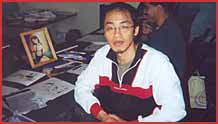|
Despite the difficulties, though, attendees were upbeat. There's certainly no shortage of shoptalk. But between tips on laying screen tones (get an assistant and pay him anything he wants) and how to highlight spiky blue hair with Copic markers, the fans behind the artists emerge. After all, for so many it was hopes of creating great manga stories like those they read as children that ultimately drove them to put pencil to paper. Liao, a former Economics major at UCLA, got hooked when he saw Haruhiko Mikimoto's design work in "Robotech" and he has been drawing in the manga style ever since. Like most artists, Liao started by mimicking the works of fan favorites like Inoue Takehiko ("Slam Dunk") and Hojo Tsukaza ("City Hunter"). But he has long since striven to cultivate an original artistic voice of his own. "I don't want to be the one riding the wave, I want to be the first one to jump in there," he says. Also hailing from the school of self-taught artists, Robert Su is a web designer and art director for portofasia.com. As Su expertly applied zipatone to a photocopy of a Liao original, he commented on his deep passion for manga. "It will be my single greatest regret if I don't get to do manga comics professionally someday," Su said. Luckily, one of Su's impending professional projects is an online magazine that will include a manga section. But it's hard to pursue this field professionally in the U.S., Akemi Katsumura was a professional manga artist in Japan who journeyed stateside looking for similar work. "In Japan I worked on a magazine and made money, but after coming here there is no material for drawing. I need a special pen, I need special ink...In my country, its everywhere...but here its hard to find so I just quit." She still draws for her own pleasure, and enjoys the fact that Comic World allows others to see, and perchance purchase, some of her works. Many doujinshites, though, don't appear dissuaded by the lack of professional outlets for their particular artistic proclivities. They find comfortable employment using their creative skills, happily bidding their time till the revolution comes. When the American fan base lies poised to support a domestic manga industry, this frontline of creators stand ready to take up the call. THE FUTURE -- How long will the likes of Liao, Su, Kazekemi and others have to wait for the doujinshi industry to boom here? Certain trends within the domestic comic industry point to growing absorption of manga sensibilities. Just perusing the cover art at local comic shops indicates there is room for optimism. Joe Maduriera's "Battle Chasers," Kevin Lau's "Vampi," not to mention the entire comic line put out by Pat Lee's Dreamwave productions all provide ample evidence of the manga art style's suffusion and popularity. But simply adopting manga style art isn't enough for Comic World attendees. For as Su and Liao point out, though the art may have distinctive manga features, the stories are a far cry from the variety and depth Japanese comics offer. "There is only one kind of story in American comics...superheroes,"
Su says.
"Yeah, or cheap 'Blade Runner' rip-offs," Liao adds.
EVENT: For more information about Comic World 3 visit www.comicworld-la.com. For more information about goods and stuff visit http://www.comictones.com |

